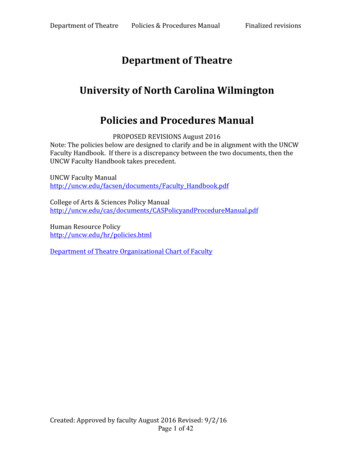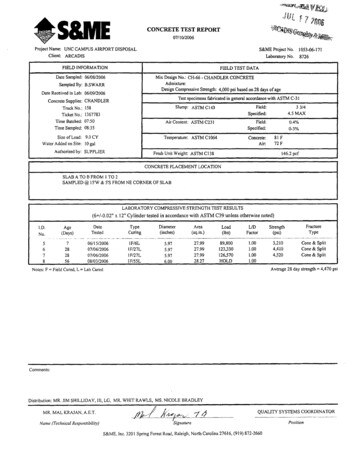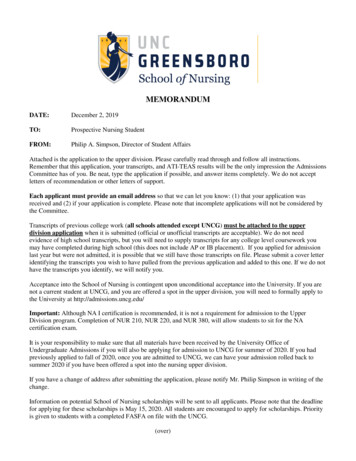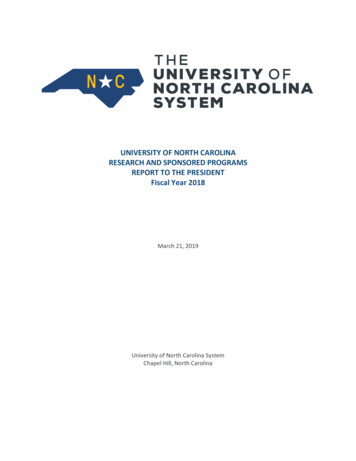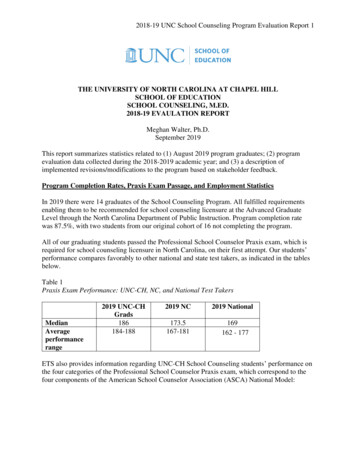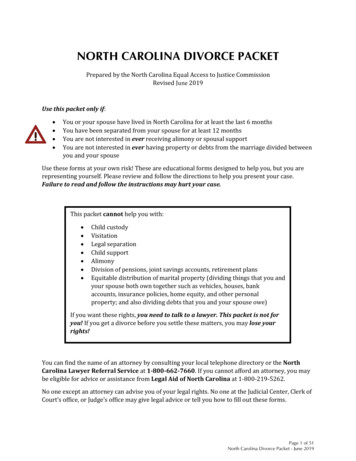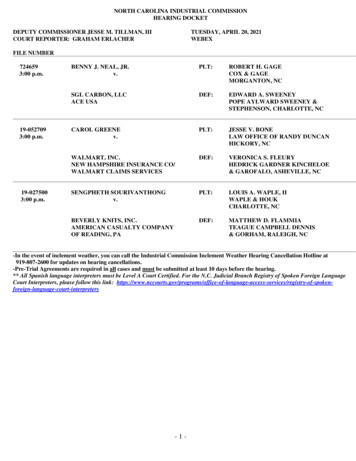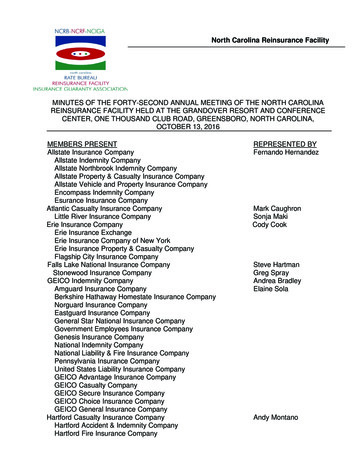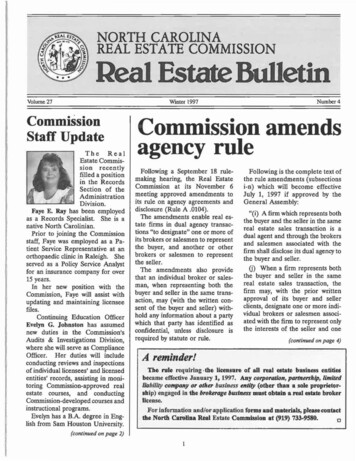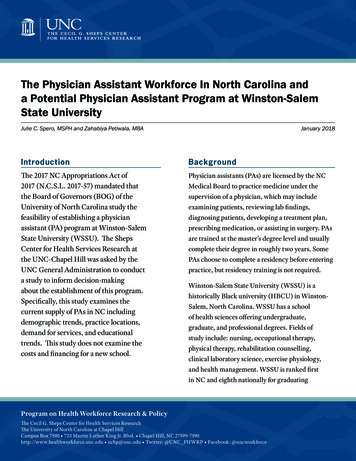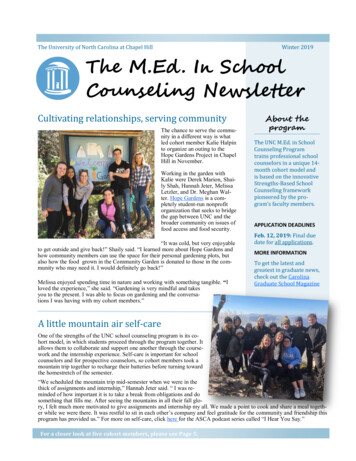
Transcription
The University of North Carolina at Chapel HillWinter 2019The M.Ed . In SchoolCounseling NewsletterCultivating relationships, serving communityThe chance to serve the community in a different way is whatled cohort member Kalie Halpinto organize an outing to theHope Gardens Project in ChapelHill in November.Working in the garden withKalie were Derek Marion, Shaily Shah, Hannah Jeter, MelissaLetzler, and Dr. Meghan Walter. Hope Gardens is a completely student-run nonprofitorganization that seeks to bridgethe gap between UNC and thebroader community on issues offood access and food security.“It was cold, but very enjoyableto get outside and give back!” Shaily said. “I learned more about Hope Gardens andhow community members can use the space for their personal gardening plots, butalso how the food grown in the Community Garden is donated to those in the community who may need it. I would definitely go back!”Melissa enjoyed spending time in nature and working with something tangible. “Iloved the experience,” she said. “Gardening is very mindful and takesyou to the present. I was able to focus on gardening and the conversations I was having with my cohort members.”About theprogramThe UNC M.Ed. in SchoolCounseling Programtrains professional schoolcounselors in a unique 14month cohort model andis based on the innovativeStrengths-Based SchoolCounseling frameworkpioneered by the program’s faculty members.APPLICATION DEADLINESFeb. 12, 2019: Final duedate for all applications.MORE INFORMATIONTo get the latest andgreatest in graduate news,check out the CarolinaGraduate School MagazineA little mountain air self-careOne of the strengths of the UNC school counseling program is its cohort model, in which students proceed through the program together. Itallows them to collaborate and support one another through the coursework and the internship experience. Self-care is important for schoolcounselors and for prospective counselors, so cohort members took amountain trip together to recharge their batteries before turning towardthe homestretch of the semester.“We scheduled the mountain trip mid-semester when we were in thethick of assignments and internship,” Hannah Jeter said. “ I was reminded of how important it is to take a break from obligations and dosomething that fills me. After seeing the mountains in all their fall glory, I felt much more motivated to give assignments and internship my all. We made a point to cook and share a meal together while we were there. It was restful to sit in each other’s company and feel gratitude for the community and friendship thisprogram has provided us.” For more on self-care, click here for the ASCA podcast series called “I Hear You Say.”For a closer look at five cohort members, please see Page 5.
WINTER 2019 UNC School Counseling NewsletterFaculty cornerCutting-edge research byDr. Clinton S. Bolton IIIThis semester has been very busyfor me because I have been juggling multiple research projects.Over the past six months, I havebeen working on asystematic reviewwith a public healthspecialist.Additionally, I directedmental health courses andintegrated health coursesfor Obesity Week in Nashville, Tennessee, in November 2018 to train mental health practitioners onbest practices while working with individuals whosuffer from obesity. During thisconference, I also served as partof the expert panel for mentalhealth.Moving forward, I will serve in2019 as a member of the Diversity and Inclusion team for theAmerican Society for Metabolicand Bariatric Surgery.2Dog therapy was part of the mental health summitVolunteering at teen mental health summitgood experience for cohort membersIn October, cohort members Kaia Bednar, Billy Lane, Kim Miller andSuzy Niederland volunteered to help with #TeenAnxiety: A Youth MentalHealth Summit, sponsored by Stand by Me NC and Faith Connections onMental Illness. The four helped lead small group discussions after theshowing of the Indieflix documentary, “Angst: Raising Awareness AboutAnxiety.”“I enjoyed serving as a group leader,” Kim said. “Initially, I was reallynervous, but I had a small group that was extremely open to sharing so thatmade my experience easier.”The cohort members agreed that the summitwas a great place to put new skills gainedfrom the summer’s classes to the test.“The skills we learned in both of our summer courses - groups and theories/techniques - helped me lead my group,”Billy said. “I especially leaned on some ofthe “micro skills” - such as the use of silence - we learned in Dr. Bolton’s class. Dr.Griffin’s groups class definitely help meopen the session and work with group members to develop group normsand the code of cooperation.”Because of the groups class, Kaia said, she knew what to expect with thesmall group.“The typical initial session awkwardness did not throw me off, and it wasneat to see the teens slowly open up and take risks while sharing,” shesaid. “Since it was my first group session since our groups class, there aresome things I may have done differently as the facilitator but, all in all, itwas a valuable learning experience.”2Our review is titled,“The Effectivenessof Telehealth use inBoltonManaging Anxietyand Depression in AfricanAmerican Adults.” This is cutting-edge research in mentalhealth because telehealth is amove of the future, and gettingahead of this move is monumental. Moreover, this will enhancethe effectiveness of mental healthservices that are provided remotely. This completed review ispending publication and was accepted for presentation at the MedInfo Conference in Lyon,France, in August 2019.
WINTER 2019 UNC School Counseling NewsletterWhat I learned from Dinosaur School:Always carry stickersBy Reem TabetCohort memberBefore starting graduate school, I spent about two years collecting and codingdata and assisting on the intervention team for a research study called the SelfRegulation Skills for Success (SRSS) Study at the UNC Frank Porter GrahamChild Development Institute. The SRSS Study investigates the efficacy of implementing an already-established clinical intervention program, the IncredibleYears Dina Dinosaur Small Group Program, in a school setting.The study targeted first- and second-graders identified as having significant selfregulation difficulties at several schools in central North Carolina.As part of the intervention program, half of the participating students attended “Dinosaur School” to learn about academic engagement, friendship skills, and behavioral and emotional selfregulation. The intervention team worked closely with the schoolcounselor at each participating school to administer biweeklysmall group sessions throughout the school year.ReemProfessionaldevelopmentNC Counselor Association Conference “Counselors Committed to Advocacy”February 20-22, 2019,Durham, NC. Clickhere for more info.Suicide and Bullying:Preventing SuicideFree webinar that explores risk and protective factors amongyouth and reviews prevention strategies.Click here to access thewebinar archiveWorking on the SRSS Study was what got me interested in school counseling inthe first place, and I still use my Dinosaur School skills every single day wheninteracting with students at my internship.One of the most important things I learned from my time on the SRSS team isthat sometimes you're going to go through plans A-F before the kids even enterthe room. Even if you don't cover any “meaningful” content that session, justhaving a space for positive adult and peer interactions can make a significantdifference for a lot of students. Also, never go anywhere without stickers. Kidswill almost always go wild for the chance to smack a sticker right in the middleof their foreheads, which makes for a surprisingly handy tool for behavioral reinforcement.Here's to the spring semester and finding new ways to integrate my DinosaurSchool experiences at my internship site!PS: Here's a really cool presentation that Dr. Desiree Murray, the principal investigator of the study, gave last year about adapting clinic-based mental health programs for use in schools. Check it out if you want to learn more about the kind ofwork SRSS is doing! bit.ly/SRSSstudySchools will celebrate National School Counseling Week in February with a themeof “School Counselors: Providing Lessons for Life.” This is not only a great time tothank counselors for all they do, but also a chance for us to focus attention on thepositive difference we make in the lives of students. National School CounselingWeek is sponsored by the American School Counselor Association (ASCA) to highlight the tremendous impact school counselors can have in helping students achieveschool success and plan for a career. Click here for lots of ASCA-provided resourcesto help you promote your work and celebrate National School Counseling Week!Want more information on charactereducation?Subscribe to theNCDPI Character Education listserv by clicking Sign Up for Updates and checkingCharacter Education inthe list of topics.3
WINTER 2019 UNC School Counseling NewsletterOff to the NCSCA conferenceSelena Pruitt,Brenna Lewis &Sam Weissler:Diversity in Gifted EducationSelena: We chosethis topic becausewe were interested by the lack ofdiversity inCHCCS' LEAPprogram, wanted to know more about the selection processbehind LEAP and other gifted services, and figure out whatrole school counselors could play in helping ensure moreequitable access to AIG services for underrepresented populations.The North Carolina School Counseling Association held its annual conference in Greensboro inNovember. The organization encourages graduatestudents to create a poster on a topic of professional interest and present it to attendees. Theposter presentation represents a great opportunityto collaborate with cohort members and networkwith other counseling professionals. Each yearour program is well-represented at this event, and2018 was no exception!LennoxBalog andKalie Halpin: Bridging theCommunication GapBetweenStudents andFacultyLennox: Itruly enjoyed the opportunity to share my personal interests and findings. I met new professionals and the experience sparked really great conversation.Interns on the jobWall of Kindness (Melissa Letzler, E.K. Powe Elementary)We celebrated Week of Kindness, which used to be Anti-Bullying Week,but now it more directlyteaches what kindnesslooks like and how wecan create a school community that is supportiveand kind. Teachers gavetheir students stickers sothey could share whatkindness meant to themand how they show kindness to their classmatesand teachers.Gratitude Tree (Kaia Bednar, Ephesus Elementary)The character trait for the month of November was gratitude. As a part ofthe classroom lesson, we asked our kindergartners and first-graders to tellus what they were thankful for by writing and drawing it out on a leaf toadd to our tree.44
WINTER 2019 UNC School Counseling NewsletterDates of noteJanuary 21-25GLSEN No Namecalling WeekFebruaryAfrican AmericanHistory MonthFebruary 17National Random Acts ofKindness DayMarchDevelopmental Disabilities Awareness MonthWho’s in the 2018-2019 cohort? A look at 5BILLY LANEBA in History, NC StateUniversity Internshipsite Sanderson HighSchool Previousposition: Social studiesteacher at Apex Friendship High Why school counseling? Theaspects of teaching that I most enjoyed helping students and building relationships- match up well with the roles of schoolcounselors Greatest strength Compassion for others Fun fact I’m a unicorn: red hair, blue eyes, left-handed Favorite musical act Johnny Cash Favorite restaurant or college hangout ThePlayers Retreat Favorite vacationspot Cinque TerreBRENNA LEWISMarch 4-10National School SocialWork WeekMarch 8International Women’sDayFollow alongCheck out UNC SchoolCounseling goings-on onTwitter and Instagram at@uncschcounsm ed55BS in Psychology, Towson University Internship site ReedyCreek Middle School Previous position CCRTeacher's Assistant atMills Park Elementary Why school counseling? I love working with children andthink I have the skills to be successful inthis profession Greatest strength I amvery understanding and do my best to makepeople feel comfortable Favorite musical act Florida Georgia Line Fun fact Iam getting married in November 2019!DEREK MARIONBA in Broadcast Journalism,Virginia CommonwealthUniversity Previousposition Sports broadcaster/producer Internship siteDurham School of the Arts Why school counseling? I enjoy workingwith people, students in particular. I want tohelp them find their own strengths so they cantransition successfully into adulthood. Greatest strength Patience when working withstudents Fun fact I’m an award-winningsports broadcaster Favorite book A Farewellto Arms Favorite musical act blink-182 Favorite restaurant or hangout spot TheCrunkletonMELISSA LETZLERBS in Psychology,Duke University Internship siteE.K. PoweElementarySchool Previous positionClinical research assistant Most looking forward toworking with kids! Whyschool counseling? I find theschool environment inspiringand uplifting, and I love howsincere and hopeful childrenare despite the adversitiesthey face. Additionally, I likehow school counselors collaborate and support teachers. Greatest strength Empathy Fun fact I’m a trainedtap dancer! Favorite bookThe Great Gatsby Favorite vacation spot Jamaica!KIM MILLERBAin PublicAdministrationwith aspecialization innonprofitstudies, The Ohio State University Previous positionSpecial education teacher atKinston High School Internship site North WakeCollege and Career Academy Why school counseling?I want to work with studentsand make them feel safe,heard, and valued Fun factI was a Peace Corps volunteerin Liberia, West Africa Favorite book Gone Girl,The Girl on the Train Funthing you’ve done I ran a 5kin April with my best friendLOOK FOR MORE COHORT PROFILES IN THE SPRING 2019 NEWSLETTER
The UNC M.Ed. in School Counseling Program trains professional school counselors in a unique 14-month cohort model and is based on the innovative Strengths-Based School Counseling framework pioneered by the pro-gram’s faculty members. APPLICATION DEADLINES Feb. s, t r9: Final due date for all applications. MORE INFORMATION To get the latest and
